- Home
- Henry James
The Bostonians, Vol. II Page 6
The Bostonians, Vol. II Read online
Page 6
"No, not a word of it!" Ransom answered, with a kind of joyous sincerity. "But it doesn't make any difference."
"Oh, it makes a great deal of difference to me!" Verena cried.
"I mean to me. I don't care in the least whether I agree with you," Ransom said, looking askance at young Mr. Burrage, who had detached himself and was getting something for Verena to eat.
"Ah, well, if you are so indifferent!"
"It's not because I'm indifferent!" His eyes came back to her own, the expression of which had changed before they quitted them. She began to complain to her companion, who brought her something very dainty on a plate, that Mr. Ransom was "standing out," that he was about the hardest subject she had encountered yet. Henry Burrage smiled upon Ransom in a way that was meant to show he remembered having already spoken to him, while the Mississippian said to himself that there was nothing on the face of it to make it strange there should be between these fair, successful young persons some such question of love or marriage as Mrs. Luna had tattled about. Mr. Burrage was successful, he could see that in the turn of an eye; not perhaps as having a commanding intellect or a very strong character, but as being rich, polite, handsome, happy, amiable, and as wearing a splendid camellia in his buttonhole. And that he, at any rate, thought Verena had succeeded was proved by the casual, civil tone, and the contented distraction of eye, with which he exclaimed, "You don't mean to say you were not moved by that! It's my opinion that Miss Tarrant will carry everything before her." He was so pleased himself, and so safe in his conviction, that it didn't matter to him what any one else thought; which was, after all, just Basil Ransom's own state of mind.
"Oh! I didn't say I wasn't moved," the Mississippian remarked.
"Moved the wrong way!" said Verena. "Never mind; you'll be left behind."
"If I am, you will come back to console me."
"Back? I shall never come back!" the girl replied gaily.
"You'll be the very first!" Ransom went on, feeling himself now, and as if by a sudden clearing up of his spiritual atmosphere, no longer in the vein for making the concessions of chivalry, and yet conscious that his words were an expression of homage.
"Oh, I call that presumptuous!" Mr. Burrage exclaimed, turning away to get a glass of water for Verena, who had refused to accept champagne, mentioning that she had never drunk any in her life and that she associated a kind of iniquity with it. Olive had no wine in her house (not that Verena gave this explanation) but her father's old madeira and a little claret; of the former of which liquors Basil Ransom had highly approved the day he dined with her.
"Does he believe in all those lunacies?" he inquired, knowing perfectly what to think about the charge of presumption brought by Mr. Burrage.
"Why, he's crazy about our movement," Verena responded. "He's one of my most gratifying converts."
"And don't you despise him for it?"
"Despise him? Why, you seem to think I swing round pretty often!"
"Well, I have an idea that I shall see you swing round yet," Ransom remarked, in a tone in which it would have appeared to Henry Burrage, had he heard these words, that presumption was pushed to fatuity.
On Verena, however, they produced no impression that prevented her from saying simply, without the least rancour, "Well, if you expect to draw me back five hundred years, I hope you won't tell Miss Birdseye." And as Ransom did not seize immediately the reason of her allusion, she went on, "You know she is convinced it will be just the other way. I went to see her after you had been at Cambridge—almost immediately."
"Darling old lady—I hope she's well," the young man said.
"Well, she's tremendously interested."
"She's always interested in something, isn't she?"
"Well, this time it's in our relations, yours and mine," Verena replied, in a tone in which only Verena could say a thing like that. "You ought to see how she throws herself into them. She is sure it will all work round for your good."
"All what, Miss Tarrant?" Ransom asked.
"Well, what I told her. She is sure you are going to become one of our leaders, that you are very gifted for treating great questions and acting on masses of people, that you will become quite enthusiastic about our uprising, and that when you go up to the top as one of our champions it will all have been through me."
Ransom stood there, smiling at her; the dusky glow in his eyes expressed a softness representing no prevision of such laurels, but which testified none the less to Verena's influence. "And what you want is that I shouldn't undeceive her?"
"Well, I don't want you to be hypocritical—if you shouldn't take our side; but I do think that it would be sweet if the dear old thing could just cling to her illusion. She won't live so very long, probably; she told me the other day she was ready for her final rest; so it wouldn't interfere much with your freedom. She feels quite romantic about it—your being a Southerner and all, and not naturally in sympathy with Boston ideas, and your meeting her that way in the street and making yourself known to her. She won't believe but what I shall move you."
"Don't fear, Miss Tarrant, she shall be satisfied," Ransom said, with a laugh which he could see she but partially understood. He was prevented from making his meaning more clear by the return of Mr. Burrage, bringing not only Verena's glass of water but a smooth-faced, rosy, smiling old gentleman, who had a velvet waistcoat, and thin white hair, brushed effectively, and whom he introduced to Verena under a name which Ransom recognised as that of a rich and venerable citizen, conspicuous for his public spirit and his large almsgiving. Ransom had lived long enough in New York to know that a request from this ancient worthy to be made known to Miss Tarrant would mark her for the approval of the respectable, stamp her as a success of no vulgar sort; and as he turned away, a faint, inaudible sigh passed his lips, dictated by the sense that he himself belonged to a terribly small and obscure minority. He turned away because, as we know, he had been taught that a gentleman talking to a lady must always do that when a new gentleman is presented; though he observed, looking back, after a minute, that young Mr. Burrage evidently had no intention of abdicating in favour of the eminent philanthropist. He thought he had better go home; he didn't know what might happen at such a party as that, nor when the proceedings might be supposed to terminate; but after considering it a minute he dismissed the idea that there was a chance of Verena's speaking again. If he was a little vague about this, however, there was no doubt in his mind as to the obligation he was under to take leave first of Mrs. Burrage. He wished he knew where Verena was staying; he wanted to see her alone, not in a supper-room crowded with millionaires. As he looked about for the hostess it occurred to him that she would know, and that if he were able to quench a certain shyness sufficiently to ask her, she would tell him. Having satisfied himself presently that she was not in the supper-room, he made his way back to the parlours, where the company now was much diminished. He looked again into the music-room, tenanted only by half-a-dozen couples, who were cultivating privacy among the empty chairs, and here he perceived Mrs. Burrage sitting in conversation with Olive Chancellor (the latter, apparently, had not moved from her place), before the deserted scene of Verena's triumph. His search had been so little for Olive that at the sight of her he faltered a moment; then he pulled himself together, advancing with a consciousness of the Mississippi manner. He felt Olive's eyes receiving him; she looked at him as if it was just the hope that she shouldn't meet him again that had made her remain where she was. Mrs. Burrage got up, as he bade her good-night, and Olive followed her example.
"So glad you were able to come. Wonderful creature, isn't she? She can do anything she wants."
These words from the elder lady Ransom received at first with a reserve which, as he trusted, suggested extreme respect; and it was a fact that his silence had a kind of Southern solemnity in it. Then he said, in a tone equally expressive of great deliberation:
"Yes, madam, I think I never was present at an exhibition, an entertainment of a
ny kind, which held me more completely under the charm."
"Delighted you liked it. I didn't know what in the world to have, and this has proved an inspiration—for me as well as for Miss Tarrant. Miss Chancellor has been telling me how they have worked together; it's really quite beautiful. Miss Chancellor is Miss Tarrant's great friend and colleague. Miss Tarrant assures me that she couldn't do anything without her." After which explanation, turning to Olive, Mrs. Burrage murmured: "Let me introduce Mr. —— introduce Mr. ——"
But she had forgotten poor Ransom's name, forgotten who had asked her for a card for him; and, perceiving it, he came to her rescue with the observation that he was a kind of cousin of Miss Olive's, if she didn't repudiate him, and that he knew what a tremendous partnership existed between the two young ladies. "When I applauded I was applauding the firm—that is, you too," he said, smiling, to his kinswoman.
"Your applause? I confess I don't understand it," Olive replied, with much promptitude.
"Well, to tell the truth, I didn't myself!"
"Oh yes, of course, I know; that's why—that's why——" And this further speech of Mrs. Burrage's, in reference to the relationship between the young man and her companion, faded also into vagueness. She had been on the point of saying it was the reason why he was in her house; but she had bethought herself in time that this ought to pass as a matter of course. Basil Ransom could see she was a woman who could carry off an awkwardness like that, and he considered her with a sense of her importance. She had a brisk, familiar, slightly impatient way, and if she had not spoken so fast, and had more of the softness of the Southern matron, she would have reminded him of a certain type of woman he had seen of old, before the changes in his own part of the world—the clever, capable, hospitable proprietress, widowed or unmarried, of a big plantation carried on by herself. "If you are her cousin, do take Miss Chancellor to have some supper—instead of going away," she went on, with her infelicitous readiness.
At this Olive instantly seated herself again.
"I am much obliged to you; I never touch supper. I shall not leave this room—I like it."
"Then let me send you something—or let Mr. ——, your cousin, remain with you."
Olive looked at Mrs. Burrage with a strange beseechingness, "I am very tired, I must rest. These occasions leave me exhausted."
"Ah yes, I can imagine that. Well, then, you shall be quite quiet—I shall come back to you." And with a smile of farewell for Basil Ransom, Mrs. Burrage moved away.
Basil lingered a moment, though he saw that Olive wished to get rid of him. "I won't disturb you further than to ask you a single question," he said. "Where are you staying? I want to come and see Miss Tarrant. I don't say I want to come and see you, because I have an idea that it would give you no pleasure." It had occurred to him that he might obtain their address from Mrs. Luna—he only knew vaguely it was Tenth Street; much as he had displeased her she couldn't refuse him that; but suddenly the greater simplicity and frankness of applying directly to Olive, even at the risk of appearing to brave her, recommended itself. He couldn't, of course, call upon Verena without her knowing it, and she might as well make her protest (since he proposed to pay no heed to it) sooner as later. He had seen nothing, personally, of their life together, but it had come over him that what Miss Chancellor most disliked in him (had she not, on the very threshold of their acquaintance, had a sort of mystical foreboding of it?) was the possibility that he would interfere. It was quite on the cards that he might; yet it was decent, all the same, to ask her rather than any one else. It was better that his interference should be accompanied with all the forms of chivalry.
Olive took no notice of his remark as to how she herself might be affected by his visit; but she asked in a moment why he should think it necessary to call on Miss Tarrant. "You know you are not in sympathy," she added, in a tone which contained a really touching element of entreaty that he would not even pretend to prove he was.
I know not whether Basil was touched, but he said, with every appearance of a conciliatory purpose—"I wish to thank her for all the interesting information she has given me this evening."
"If you think it generous to come and scoff at her, of course she has no defence; you will be glad to know that."
"Dear Miss Chancellor, if you are not a defence—a battery of many guns!" Ransom exclaimed.
"Well, she at least is not mine!" Olive returned, springing to her feet. She looked round her as if she were really pressed too hard, panting like a hunted creature.
"Your defence is your certain immunity from attack. Perhaps if you won't tell me where you are staying, you will kindly ask Miss Tarrant herself to do so. Would she send me a word on a card?"
"We are in West Tenth Street," Olive said; and she gave the number. "Of course you are free to come."
"Of course I am! Why shouldn't I be? But I am greatly obliged to you for the information. I will ask her to come out, so that you won't see us." And he turned away, with the sense that it was really insufferable, her attempt always to give him the air of being in the wrong. If that was the kind of spirit in which women were going to act when they had more power!
XXIX
Mrs. Luna was early in the field the next day, and her sister wondered to what she owed the honour of a visit from her at eleven o'clock in the morning. She very soon saw, when Adeline asked her whether it had been she who procured for Basil Ransom an invitation to Mrs. Burrage's.
"Me—why in the world should it have been me?" Olive asked, feeling something of a pang at the implication that it had not been Adeline, as she supposed.
"I didn't know—but you took him up so."
"Why, Adeline Luna, when did I ever——?" Miss Chancellor exclaimed, staring and intensely grave.
"You don't mean to say you have forgotten how you brought him on to see you, a year and a half ago!"
"I didn't bring him on—I said if he happened to be there."
"Yes, I remember how it was: he did happen, and then you happened to hate him, and tried to get out of it."
Miss Chancellor saw, I say, why Adeline had come to her at the hour she knew she was always writing letters, after having given her all the attention that was necessary the day before; she had come simply to make herself disagreeable, as Olive knew, of old, the spirit sometimes moved her irresistibly to do. It seemed to her that Adeline had been disagreeable enough in not having beguiled Basil Ransom into a marriage, according to that memorable calculation of probabilities in which she indulged (with a licence that she scarcely liked definitely to recall) when the pair made acquaintance under her eyes in Charles Street, and Mrs. Luna seemed to take to him as much as she herself did little. She would gladly have accepted him as a brother-in-law, for the harm such a relation could do one was limited and definite; whereas in his general capacity of being at large in her life the ability of the young Mississippian to injure her seemed somehow immense. "I wrote to him—that time—for a perfectly definite reason," she said. "I thought mother would have liked us to know him. But it was a mistake."
"How do you know it was a mistake? Mother would have liked him, I daresay."
"I mean my acting as I did; it was a theory of duty which I allowed to press me too much. I always do. Duty should be obvious; one shouldn't hunt round for it."
"Was it very obvious when it brought you on here?" asked Mrs. Luna, who was distinctly out of humour.
Olive looked for a moment at the toe of her shoe. "I had an idea that you would have married him by this time," she presently remarked.

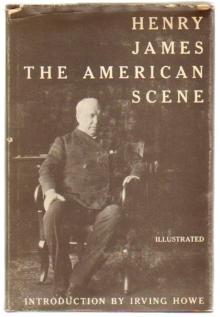 The American
The American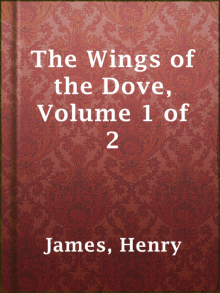 The Wings of the Dove, Volume 1 of 2
The Wings of the Dove, Volume 1 of 2 Frost at Midnight
Frost at Midnight Morning Frost
Morning Frost The Portrait of a Lady — Volume 1
The Portrait of a Lady — Volume 1 Fatal Frost
Fatal Frost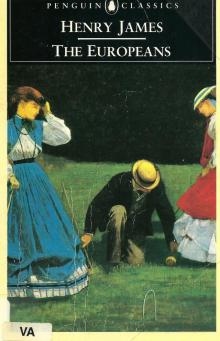 The Europeans
The Europeans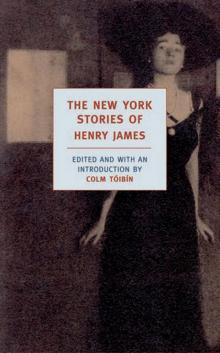 The New York Stories of Henry James
The New York Stories of Henry James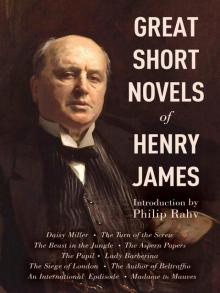 Great Short Novels of Henry James
Great Short Novels of Henry James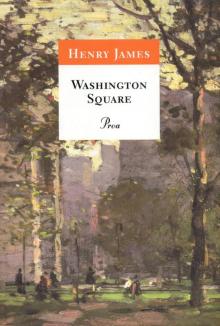 Washington Square
Washington Square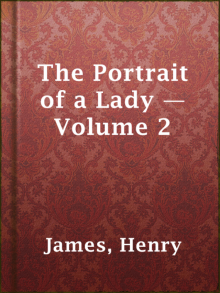 The Portrait of a Lady — Volume 2
The Portrait of a Lady — Volume 2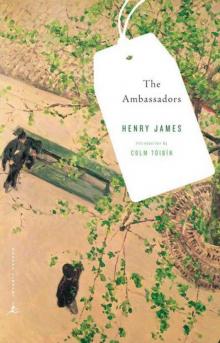 The Ambassadors
The Ambassadors The Wings of the Dove
The Wings of the Dove The Princess Casamassima (Classics)
The Princess Casamassima (Classics) The Coxon Fund
The Coxon Fund First Frost
First Frost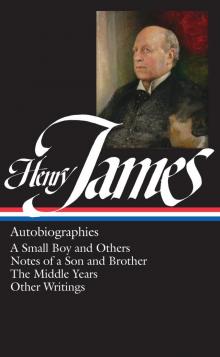 Henry James
Henry James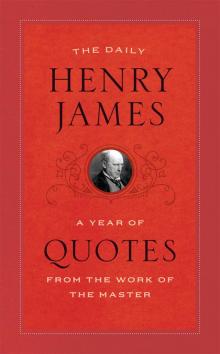 The Daily Henry James
The Daily Henry James Travels With Henry James
Travels With Henry James The Reverberator: A Novel
The Reverberator: A Novel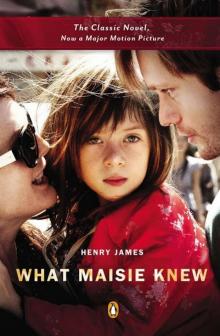 What Maisie Knew (Henry James Collection)
What Maisie Knew (Henry James Collection)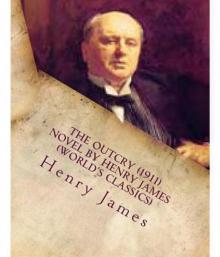 The Outcry
The Outcry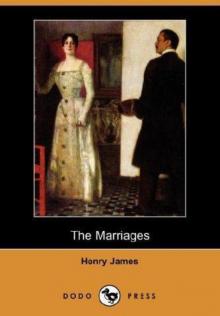 The Marriages
The Marriages The Wings of the Dove, Volume 2
The Wings of the Dove, Volume 2 The Bostonians, Vol. I
The Bostonians, Vol. I The Outcry: -1911
The Outcry: -1911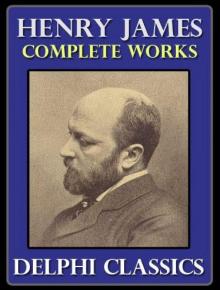 The Complete Works of Henry James
The Complete Works of Henry James Letters from the Palazzo Barbaro
Letters from the Palazzo Barbaro The Pupil
The Pupil The Bostonians, Vol. II
The Bostonians, Vol. II Pandora
Pandora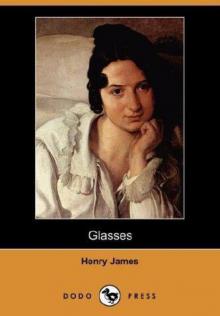 Glasses
Glasses The Princess Casamassima
The Princess Casamassima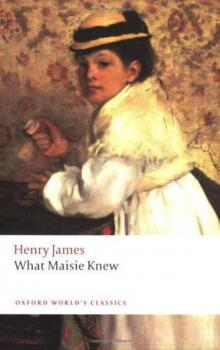 What Maisie Knew
What Maisie Knew The Reverberator
The Reverberator The Golden Bowl - Complete
The Golden Bowl - Complete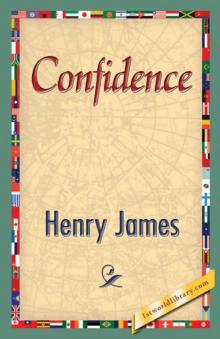 Confidence
Confidence Wings of the Dove (Barnes & Noble Classics Series)
Wings of the Dove (Barnes & Noble Classics Series) The Spoils of Poynton
The Spoils of Poynton